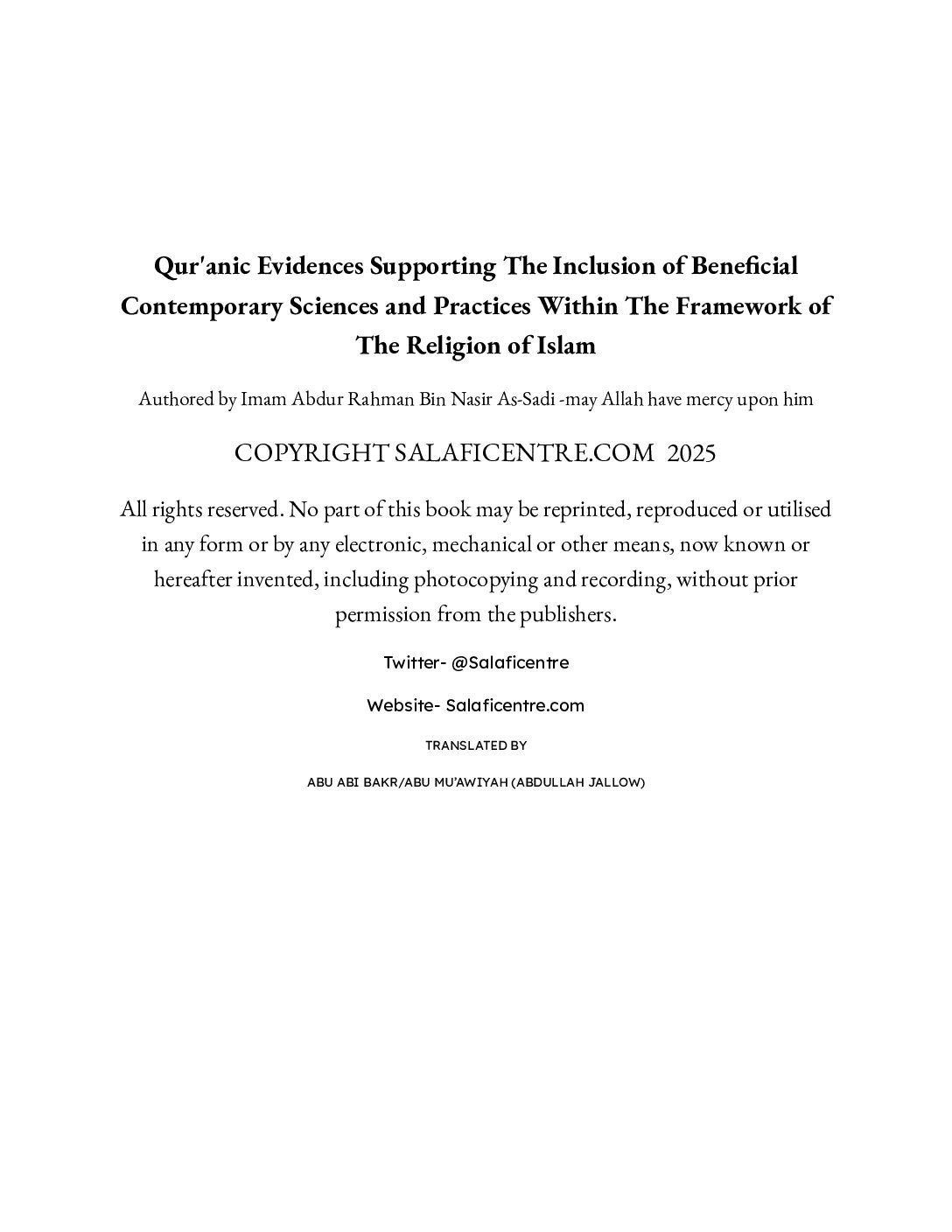In The Name of Allaah, The Most Merciful, The Bestower of Mercy.
Beware of Ambiguities And General Statements
Imaam Ibnul Qayyim [rahimahullaah] said: The basis of Banee Aadam’s misguidance is as a result of ‘General Terms’ and ‘Ambiguous Meanings’ [i.e. terms & meanings which can either be utilised for truth or falsehood when not explained in detail and distinguished], especially if they come in contact with a confused mind, then how about when [evil] desires and misguided enthusiasm is added to that? Therefore, ask the One Who keeps the hearts steadfast [i.e. Allaah] to keep your heart firm upon His Religion and not allow you to fall into this darkness. [Ref 1]
The basis of a person’s Islaam is to testify that there is no deity worthy of worship except Allaah and that Muhammad [sallal-laahu-alayhi- wasallam] is the Messenger of Allaah, to believe in Allaah, declare that Allaah is One without partner, obey Allaah’s commands, keep away from what Allaah has forbidden and single out Allaah in worship. And safeguarding this path [necessitates] the prohibition of every expression [term or word] that contains Shirk Billaah [i.e. ascribing partners to Allaah] or Kufr, or will lead to one of the two. [Ref 2] In the Qur’aan, there are many words that are utilised to rebut the words [or terms] that are in opposition to the call of the Messengers, the revelation that was revealed to them and the truth they brought. [Ref 3]
One of the general fundamental principles [in Islaam] is to know that words [or terms] are two types: Words that are mentioned in the Qur’aan and [authentic] Sunnah, therefore, it is obligated on every believer to affirm them – affirm what Allaah and His Messenger have affirmed, and negate what Allaah and His Messenger have negated. The words [or terms] affirmed by Allaah is truth and the ones Allaah negated are [negated] in truth, for indeed Allaah speaks the truth and guides to the straight path. The words [or terms] of the Sharee’ah are sanctified, and it is from perfection in knowledge that one seeks after the [sound meanings] which the Messenger [sallal laahu alayhi wasalam] intended by them, in order to affirm what he affirmed and negate the meanings he negated; for indeed it is obligated on us to believe and bear witness to everything he has stated and follow him in everything he has commanded.
As for the words [or terms] that are neither found in the Qur’am and [authentic] Sunnah, nor did the Salaf hold a consensus regarding whether they are negated or affirmed, then it is not incumbent on anyone to agree with the one who negates them or affirms them until its intended meaning is explained. So, if its intended meaning agrees with the [revelation, commands, prohibitions etc] conveyed by the Messenger, it is affirmed; but if its intended meaning is in opposition to the [revelation, commands, prohibitions etc] conveyed by the Messenger, it is rejected. [Ref 4]
Value Those Who Give Detail When It Is Necessary And Bear In Mind That Not Every Student of Knowledge Is Able To Give Detail In Every Subject Matter
Imaam Ibnul Qayyim [rahimahullaah] said: “It is obligated on you to give detail and make a distinction, because unrestricted and general [statements] without clarification has indeed corrupted this existence [i.e. the world], and misguided the intellects and views [of the people] in every era”.
There has to be detail explanation. The one who is not proficient in giving detail should keep quiet, because benefit is not acquired from his speech. And every time error occurs, its cause is due to an absence of detail explanation regarding truth and falsehood. There has to be detail explanation and distinction and not to mix up [affairs]. Indeed, it may be that there is something of truth and falsehood in an opponent’s statement, so all of it is neither deemed to be false nor truth; rather there has to be a distinction between its truth and falsehood. All of it is neither rejected nor accepted; rather a distinction is made regarding the truth and what is correct and the falsehood and error in it. And if you are not proficient in giving detail, then you should not enter into this field. [5]
Shaikh Abdur Razzaaq Al-Badr [hafidhahullaah] spoke about generosity in the affairs of knowledge in one of his lessons and then stated that Ibnul Qayyim [rahimahullaah] reported about Shaikhul Islaam Ibn Taymiyyah’s [rahimahullaah] amazing generosity in this affair. Then Shaikh Abdur Razzaaq [hafidhahullaah] referred the listeners to Madaarij As-Saalikeen regarding this affair. Here is a brief Faa-idah about the affair.
In Madaarij As-Saalikeen Imaam Ibnul Qayyim [rahimahullaah] spoke about generosity and its different levels, then he said that to be generous with one’s knowledge is from those loftiest levels of generosity. *To be generous with knowledge is more virtuous than generosity with wealth, because knowledge is more noble than wealth. *To be generous with knowledge necessitates that when a questioner asks a question related to the religion, you give him [or her] a detail and sufficient answer and not an answer that is only sufficient to address the needs of the questioner. *Indeed I [i.e. Ibnul Qayyim] have witnessed something amazing about Shaikhul Islaam Ibn Taymiyyah [rahimahullaah] in relation to this affair. When he [Ibn Taymiyyah] used to be asked about an affair that requires a ruling, he would mention in his response-if he was able to do so- the Madhab of the four Imaams, the reason behind the difference of opinion and the position that carries more weight. He would also mention the other issues related to the subject matter which might even be more beneficial for the questioner than the issue he [or she] asked about. *The Sahaabah [radiyallaahu-anhum] asked the Prophet [sallal-laahu-alayhi-wasallam] about performing ablution with sea water, so he [sallal-laahu-alayhi-wasallam] said, ‘’Its water is purifying [i.e. can be used for ablution] and its dead [animals] are lawful [to eat].’’ [Bulooghul Maraam’ Hadeeth 1. Book of Purification]. So, the Prophet [sallal-laahu-alayhi-wasallam] answered their [main] question and then generously gave them [an extra response] regarding what they would be more in need of -at certain times- than the initial affair they asked about. [Ref 6]
Verify And Seek Explanation From The One You Can Reach If You Cannot Understand His Statement


Shaikh Uthaymeen [rahimahullaah] said:
Verification is one of the most important affairs, if not the most important. Verifying what is transmitted from others is an important affair, because sometimes the transmitters harbour evil intentions, so they transmit – intentionally and deliberately – that which will tarnish the reputation of the one they transmit from. And sometimes they do not harbour an evil intention, but they understand something in a manner that is opposite to what is intended by it. Therefore, it is obligatory to verify. So, when the proof [sound source] of the transmission is established, then the one from whom the statement was transmitted is engaged in a discussion [or his statement is examined] before a judgement is passed as to whether it is a mistake or not. That is because it may become clear to you – by way of discussion [or observation] – that the one from whom the statement was transmitted is correct. And if not, then what is known is that if a person were to immediately pass a judgement merely based on what he hears, he will transmit things [i.e. statements, views, opinions etc] from some of the scholars – those considered to be the beacons of [Sharee’ah] knowledge – that which the souls will dislike; but when one verifies, contemplates and establishes contact with this Shaikh, the affair will become clarified [or clear to him]. [7]
[Ref 1: An Excerpt from ‘As-Sawaa’iq Al-Mursalah Alal Jahmiyyah Wal Mu’attilah’ – Vol 3. page 927. slightly paraphrased]
[Ref 2: Excerpt from ‘Mu’jam Al-Manaahee Lil Laf’dhiyyah’ page 34. slightly paraphrased. Publisher: Daar Al-Aasimah. 3rd edition 1996]
[Ref 3: Excerpt from Mu’jam Al-Manaahee Lil Lafdhiyyah’ page 10. slightly paraphrased. Publisher: Daar Al-Aasimah. 3rd edition 1996]
[Ref 4: Excerpt from ‘Al-Haqeeqatus Shar’iyyah Fee Tafseeril Qur’aan Al-A’dheem Was-Sunnatin Nabawiyyah’ page 17. slightly paraphrased]
[Ref 5: Source: An Excerpt from At-Ta-leeqaat Al-Mukhtasar Alaa Al-Qaseedah an-Nooniyyah: Vol: 1 page: 216. By Shaikh Saaleh Al-Fawzaan (hafidhahullaah). Slightly paraphrased]
[Ref 6: An Excerpt from Madaarij As-Saalikeen 2/43-44. فصل : مراتب الجود – Slightly paraphrased]
[Ref 7: Excerpt from Sharh Hilyatil Taalibil Ilm Pages 75-76. By Shaikh Uthaymeen (rahimahullaah). Paraphrased]











